- Home
- Rabindranath Tagore
The Lover of God Page 3
The Lover of God Read online
Page 3
12
I know who visits your dream, Dark One.
Say her name. Her smile streaks
like lightning through clouds of sleep.
Śyāma, she has nothing with which to repay you.
Such impatience, bihaṅga!
Don’t wake my sleeping Śyāma.
And you, moon, pour down your cold milk
on the sun’s too early fire.
Sometimes time is cruel in miniature,
as when dawn crowds the last hours.
13
Not only is it dark, but clouds roar
like the Yamunā, invisible and drenching;
lightning pillages the trees.
How can I see which way to go?
Alone I stand shaking in the dark hall
of the tamāla, its fan-leaves my only roof.
Tell me, is Kān in this heartless place?
Is that why his flute goes on playing
the notes of my name? Friend, I’m going.
Help me fix this jasmine in my hair.
Open the gate—I’ll free my soul from its cage.
Don’t fly, little bihaṅga. My fear
builds like the thunder. Don’t go.
14
When we’re together, nights like this delight me.
But when the clouds come down between us
and thrash around so rudely in the trees,
then I fear, Lord, imagining your breath-taking words
lost out there among the swords of lightning.
Come, you’re drenched, Mādhava,
drenched again, in these incessant rains.
Through the war of weather you’ve come to me.
Take off your clothes. Let me dry you. I’ll untie my hair.
Come lie with me among the stalks of lotus,
skin cold and thrilled.
He’s the whole dark ocean of love.
And for the sake of love,
each being shall burn its own small flame.
15
Don’t talk about love to me, Mādhava.
Don’t play rough games with my heart.
Why do you talk of love? Your words spill
as from a boat full of holes, and my soul
spills with them, beyond saving.
I’m plainspoken—does that shock you?
Oh, your mouth has been eating sorrow!
Mādhava, I hear my own harsh voice
and am ashamed. Forgive me
the sharp arrows of my words, unfeeling one—
ah, I see where one grazed your heart...
She plays her part well,
one minute flushed and melting,
the next a petulant tease—
an ocean of love all by herself!
16
When pitiless Mādhava left for Mathurā City,
in a fit of anger Rādhā made a vow.
Unsmiling, she sent him on his way,
berating his casual heart.
Off he went, his mouth full of sweet talk,
but Rādhā did not turn to see him go.
Instead she saw the face of her own sadness
forming and breaking all night
in the river of tears. Then his soft voice
sat down beside her ragged one,
and Rādhā broke her vow,
her voice bruised by grief,
her arms longing toward him, crying:
Stay, Śyāma, my love Śyāma, stay.
Stay with me. I have no friend but you,
no love, Mādhava. No one but you.
She wrapped her arms around his feet,
her face dissolving,
while he sat murmuring
the words she longed to hear.
Rādhā, talk to me, dear friend.
Ask yourself: has Śyāma himself
ever felt such pain as this?
He came to her laughing, and now
he throws that same laugh back
over his shoulder as he leaves for Mathurā.
Not a grain of compassion clings to his feet.
Who knows how long he’ll stay?
Weeping for Rādhā, I say that life is pain.
If there were no love, there would be no grief.
17
So many times, Lord, I have implored you
to forsake the pleasures of Mathurā and
not leave me here to grieve alone.
So many times, Śyāma.
Rādhā, your tongue will get you
into trouble. Be careful whose name
you take for granted.
But isn’t he my beautiful, rich, honored
Lord of the city towers, my own Dark King,
Śyāma?
Steady yourself, friend.
Do you think no girls like you
wait for him in the gardens of the town,
imagining how they will pleasure him?
You’re not his one and only.
If you called him to you now,
your voice loud in the grove,
and he declined you,
you would split like a kusuma bud
thrown down at his feet.
He’s the heat of the conversation
in the town; all the girls know his name.
Be calm and patient. Believe me,
you endanger yourself, for you know
nothing of the real Śyāma’s love.
18
How long must I go on waiting
under the secretive awnings of the trees?
When will he call the long notes of my name
with his flute: Rādhā, Rādhā, so full of desire
that all the little cowherd-girls will start awake
and come looking for him, as I look for him.
Will he not come to me,
playing the song of Rādhā with his eyes and hands?
He will not, Yamunā.
I have one moon—Śyāma—
but a hundred Rādhās yearn for moonlight at his feet.
I’ll go to the grove, companion river.
Alone, I’ll honor our trysting-place.
No one will make me renounce it.
Come with me into the dark trees.
You’ll have your tryst,
its trembling raptures and its tears.
19
You resemble my Dark Lord Śyāma,
Death, with your red mouth
and unkempt hair, dressed in cloud.
Sheltered in your lap, my pain abates.
You are the fountain of nectar, Death,
of immortality. I say aloud
the perfect word of your name.
Mādhava has forgotten Rādhā.
But you, Dark Lord, accomplice,
you will not abandon me.
Call me now. I’ll come into your arms
in tears, but soon lapse into half-closed sleep,
drowsy with bliss, my pain erased.
You won’t forget me.
I hear a flute from the distant playgrounds,
the city far away—it must be yours,
for it plays my name.
Now darkness comes on, and with it a storm.
Clouds roil, and lightning slashes at the palms;
the desolate path twists into darkness.
I’m fearless now. I’ll meet you there, Death,
in the old trysting-place. I know the way.
Shame on your faithlessness, Rādhā.
Death is not another name for love.
You’ll learn for yourself.
20
Who are You, who keeps my heart awake?
Every moment is lit by You, so that I feel
no longer separate from You.
Whose flute is playing sweet and bitter
songs of love? It starts the cuckoos singing,
and calls the nectar-heavy bees of my desire.
A young wife could be blooming
in the season of honey, watching the moon,
&nbs
p; and be stolen in a moment.
Touch Rādhā, Whoever You are. She shivers
at Your feet, risking everything to bear
love’s searing fire. Master, is that not You?
She’s grown reckless with her soul.
Her fear is gone, her hesitation. Who are You?
She’ll weep at Your lotus feet until she knows.
21
Who wants to hear the long, miserable
story of Rādhā? Who among you
fathoms love’s mystery?
The world will see my disgrace, my stain of love,
but I won’t care. I’ll abandon myself
for one caress from Śyāma.
I’ve asked you and asked you, my friends,
not to revile him, for I have risked
everything for him: my family’s honor,
my friendships, my soul.
All these I pour out in sacrifice at his feet.
I know that men from the town slander
my Dark Lord’s name. They know nothing of love.
If my blunt words offend you, then don’t follow me
into my heart’s dark trysting-place.
Now you understand my own heart,
which bore long ago the fire that sears you.
Flames still flare up, in both body and mind.
22
I’ve fallen from my life, friend—
my tears since birth have washed my charms away.
But I’ve known pure love.
If I glimpse for an instant
my own Dark Lord on the forest path,
I kiss the dust at his feet a hundred times,
as if each grain were a jewel.
Unlucky, star-crossed birth.
I long only to stay within the shadow
of his flute and taste from afar his dark smile.
Rādhā is the Dark Lord’s Mistress!
May her pleasure be endless!
But it’s grief that’s endless,
a river of unseen tears.
Is your indifference endless also, Black One?
Its half-bloomed flowers fall unseen
into the river of human tears.
Postscript
1. Tagore and His Poetry 2
Rabindranath Tagore (1861–1941) wrote in a colonial Bengal that was alternately torn between a desire to live up to the European standards of modernity, thrust upon it by the British, and the population’s own sense of brooding nationalism that sought independence for an ancient culture revived. In this heady period Tagore’s family was among the most prominent in Calcutta, his grandfather Dwarkanath (1794–1846) having created a financial empire in banking and trade with the British and, with the proceeds, purchased large zamandari estates in east Bengal and Orissa. Tagore’s father, Debendranath (1817–1905), was nearly as shrewd a businessman as his father, maintaining the estates and solidifying the family fortune. But Debendranath was also a deeply religious man in a thoroughly modern way: he was a founding member of the Brahmo Samaj, a group of intellectuals who sought to distill India’s complex religious heritage into a nonsectarian perspective that embraced Hindus, Muslims, Buddhists, and Christians, favoring none. The philosophical impulse behind this movement was thoroughly that of classical Hindu vedānta, yet its founders were strongly akin in spirit to the Unitarians with whom they associated. Because of his personal discipline, his active religious life, and his devotion to the literatures of Sanskrit, Debendranath was known by the honorary title of Maharshi, Great Seer. It was this man who insisted that young Rabindranath steep himself in the religious texts of the Upaniṣads, with their formless, ineffable divinity unifying all of creation. Though publicly a Brahmo by choice, Debendranth was domestically traditional; he never abandoned his commitment to his status as a Brahmin; his position on caste ultimately divided the Brahmo Samaj itself. This assumption of privilege was passed on to Rabindranath, who struggled through his life with the conflict inherent to his aristocratic acceptance of a socially stratified society coexisting with his belief in the oneness of all humanity. This never-resolved tension would eventually percolate through every literary genre he touched.
When a young man, Rabindranath was schooled at home in the family mansion called Jorasanko, at no. 6, Dwarkanath Tagore’s Lane in Calcutta. Though he tried formal schooling on four occasions, none stuck, and he was left in the hands of private tutors who coached him through the rigors of a novel educational experiment that sought to bridge the intellectual worlds of a Europe imbued with the glamour of science, and a classical India with its soul-nurturing philosophies. As trite as this division may appear today, it seems to have struck a chord in Tagore, who would spend the rest of his life trying to reconcile the two into a synthesis of East and West. How could it have been otherwise for someone so sensitive and gifted; he and his family were implicated completely in the colonial project, yet deeply committed to the treasures of India’s own achievements. In this, Tagore, perhaps more than any other figure of the period, epitomizes the extremes of conflicting values that we recognize today as marks of the colonial experience.
Built in to his regimen of disciplined work and writing was an intellectually unstructured space created by his older brothers, especially Dwijendranath, Satyendranath, and Jyotirindranath (there were six brothers and two sisters in all), who encouraged one another to compose and perform music, dramas, and poetry, to write short stories and novels, and to paint. Out of this riot of activity, two other members of this extended household, Gaganendranath and Abanindranath, Tagore’s nephews, would found the Bengal School of Indian art, Abanindranath ultimately taking pride of place. The Tagore brothers were as politically active as they were eccentric. Life in this extended family, an experience that was simultaneously disciplined and freewheeling, where servants often functioned as master more than an absent father, stimulated Rabindranath with an eclectic education that included everything from the classical Sanskrit poetry of Kālidāsa to modern science. But the outlet for much of Rabindranath’s intellectual, especially literary, impulse lay in sharing his achievements with a receptive audience, for which he seldom lacked in this uncommon household. There was one who was special: a sensitive, if not intellectually accomplished, young woman named Kadambari, wife of his elder brother Jyotirindranath.
In a traditional Bengali family of this period, wives were generally younger than their husbands, sometimes considerably; it was acceptable, even encouraged, for a young woman to seek a special support among her husband’s younger brothers still living in the household. The relationship is termed “joking”; it is familiar and intimate, not formal. And it was with Kadambari that Rabindranath first felt the presence of a woman, a presence that he cherished long after her suicide in 1884 at age twenty-three or twenty-four. Over the decades that followed he would dedicate books to her, use her to model some of his heroines (such as the famous Charu), and, many surmise, on occasion write to her when he assumed his anonymous, universal voice. Kadambari’s pet name for Rabindranath was a synonym for Rabi, Bhānu. One can well imagine her powerful impact on a fourteen-year-old boy, perhaps prompting these first forays into love poetry. But one can just as easily imagine the need of the young adolescent to explore this heady subject with impersonal remove, if not impunity. Bhānusiṃha—a whimsical translation of his first and last names—gave him that freedom. The love depicted was sensual and emotional, certainly not sexually explicit, fraught with anxiety and longing, an undefinable urge to be in the presence of the beloved, but unsure of how that might be effected. The strategy of anonymity, of both the subject and object, would become an enduring feature of the elemental poetry best known to his Western audiences as mystical.
Writing from the busy confines of Jorasanko continued until the young Rabindranath made his first trip abroad, to visit England from late 1878 to early 1880, an eye-opening and not altogether pleasant experience for this young aristocrat suddenly faced with prejudices against the color of his skin and his Indian cus
toms—tempered nevertheless by a social life available to a select few. His first book, Sandhyā Saṅgīt (Evening Song), was published in 1880 and was received with no little acclaim, most notably from Bankim Chandra Chatterjee, the leading author of the day. Little more than three years later he was married to a ten-year-old girl, Mrinalini, continuing the conservative practices of his father, who arranged the marriage. In early February, right before his marriage, he published a book of poems titled Chabi o Gān (Pictures and Songs), dedicated to his beloved Kadambari; within two months she would be dead by her own hand, from poison, perhaps opium. The simultaneous upheavals of marriage and death shook Tagore, and served to complicate further his already complicated interior landscape. Restlessness set in. For the remainder of his life he was incapable of staying rooted in a single abode or engaged in a single activity.
Rabindranath participated off and on in the public life of Calcutta, both literary and political, while privately tending to the twinned domestic responsibilities of family and estates. The books poured forth, and in 1890 he went abroad again, this time for two short months to the United Kingdom, whence he abruptly returned, apparently homesick. He would not return to England for more than twenty years. But that time away in London seemed to have precipitated for him a new poetry, which first appeared in the publication of Manasi (The Lady of the Mind) shortly after his return in 1890. At last came the wider recognition for which he clearly had begun to hunger. There are two features of this poetry that would recur in ever-refined ways for the rest of his life: a distinctly Bengali sensibility, nationalist and yet regionally distinct, coupled with a personal emotional landscape that hinted of his later fascination with his living, indwelling God. Over the next several decades, one would come to reflect the other, Bengal universalized for everyman.

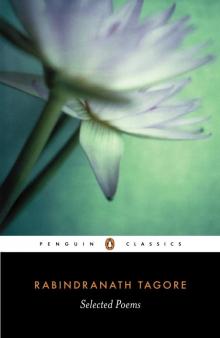 Selected Poems
Selected Poems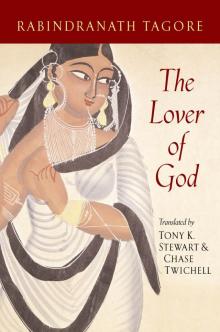 The Lover of God
The Lover of God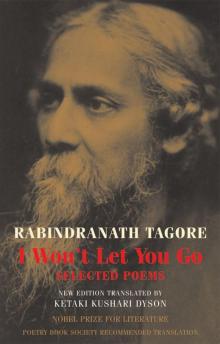 I Won't Let You Go: Selected Poems
I Won't Let You Go: Selected Poems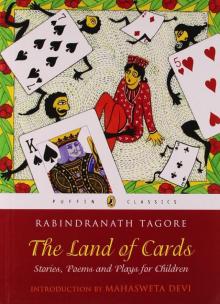 The Land of Cards: Stories, Poems, and Plays for Children
The Land of Cards: Stories, Poems, and Plays for Children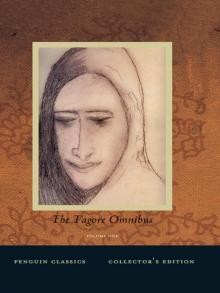 The Tagore Omnibus, Volume One
The Tagore Omnibus, Volume One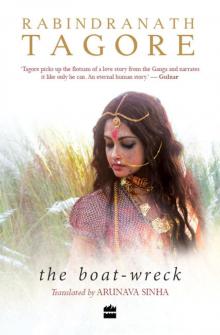 The Boat-wreck
The Boat-wreck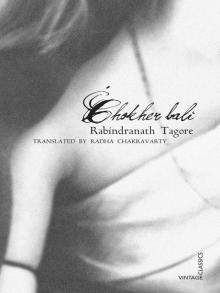 Chokher Bali
Chokher Bali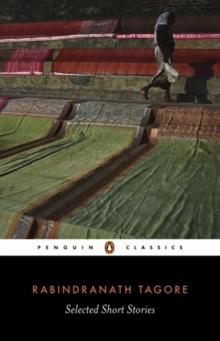 Selected Short Stories
Selected Short Stories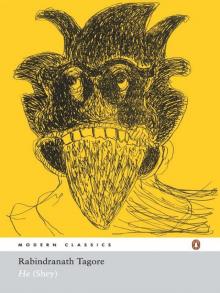 He (Shey)
He (Shey)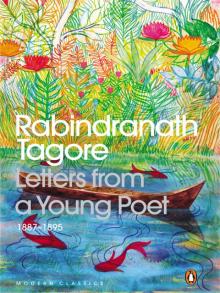 Letters From a Young Poet 1887 1895
Letters From a Young Poet 1887 1895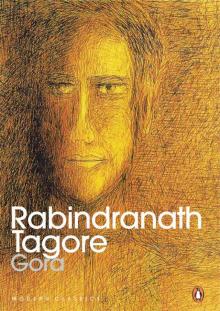 Gora
Gora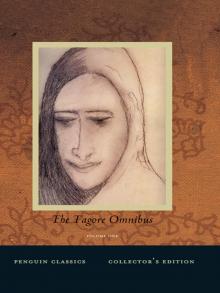 Tagore Omnibus, Volume 1
Tagore Omnibus, Volume 1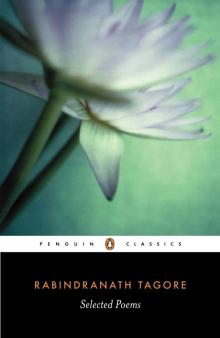 Selected Poems (Tagore, Rabindranath)
Selected Poems (Tagore, Rabindranath)